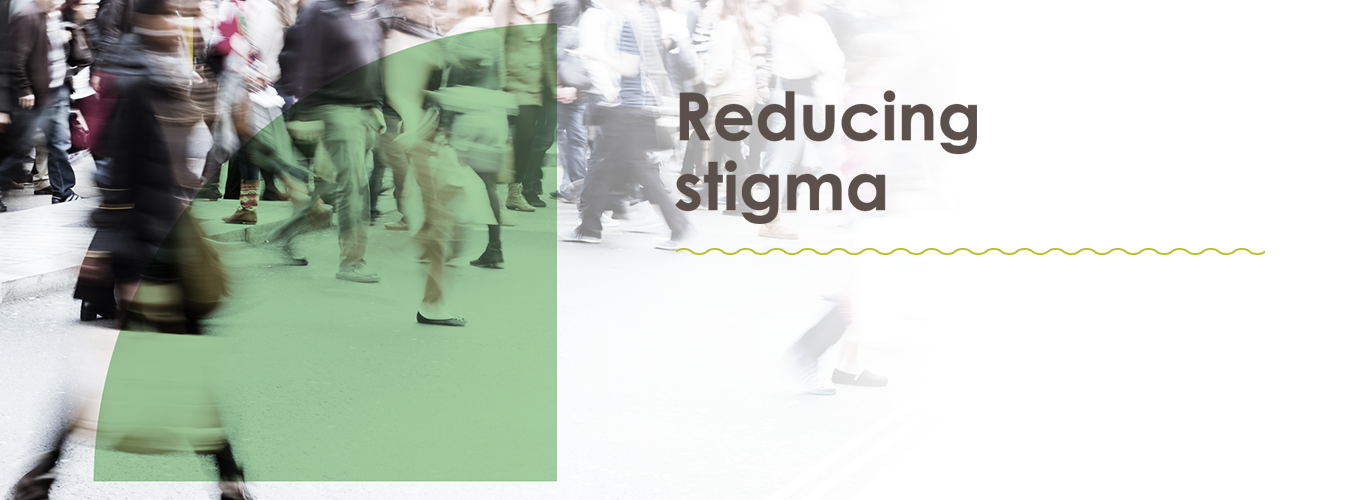
REDUCING STIGMA
It is generally accepted that widely held stigmatising beliefs about psychosis, schizophrenia and psychotic experience continue to contribute to the social exclusion and distress endured by people with these difficulties. Similar to people with psychosis, people who hold stigmatising views about psychosis often associated it with uncontrollably, unacceptability and dangerous. Stigma and the risk of social exclusion are also known to be major barriers to help seeking, and there is evidence that many young people developing psychosis are reluctant to engage with services and experience high levels of social anxiety and shame.
The need to address stigma has been internationally recognised by The World Health Organisation (2001) and World Psychiatric Association (2000) and here in the United Kingdon (UK) The National Institute for Clinical Excellence (NICE) Guidelines for Psychosis and Schizophrenia in Adults have prioritized the reduction of stigma. See HERE for more details.
Sometimes, a person with experience of psychosis may be affected by prejudice and discrimination by believing the negative stereotypes to be true of themselves. This is usually referred to as self or internalised-stigma. This is an understandable reaction to being exposed to stigmatising messages, for example those in the media. However, this can affect how a person feels about themselves, their self-esteem, the belief that they are able to cope, and for some people this can lead them to feeling low in mood and disempowered. The largest study of internalised stigma in people with a schizophrenia diagnosis found that just under half of the people who took part reported at least moderate to high levels of internalised stigma and that the most commonly experienced aspect of internalised stigma was related to social life (Brohan et al., 2010). For more details see HERE : Internalised stigma, as well as public stigma, is therefore a very important area for research.
Reducing stigma and addressing public and internalised stigma is a key research aim for at PRU. Some of the research carried out has focussed on understand the effects of internalised stigma on wellbeing, how to measure experiences of stigma and discrimination and how to reduce both public and internalised stigma.
For information about research exploring the relationship between internalised stigma and depression in young people at risk of developing psychosis and people with experience of psychosis see HERE :
Understanding an individual’s experience of stigma and measuring how this changes over time is a very important aspect of research and clinical practice. As such, we have developed a semi structured interview measure to examine people’s experience of stigma in psychosis (SIMS). For a copy of this measure see here: [link to the SIMS pdf. In the PRU website].
We have investigated ways of supporting people with internalised stigma through Cognitive Behavioural Therapy and have just published the results of our first trial of CBT for internalised stigma in people with psychosis RESPECT Trial. For a copy of the publication see HERE We have evaluation of the impact of CBT on internalised stigma in young people at risk of developing psychosis. For a copy of the publication see HERE.
At present we are looking at developing ways to evaluate the feasibility of a peer support intervention for internalised in order to futher more help towards reducing stigma.
We have investigated several ways of reducing stigma at a public level. This includes a podcast with normalising information about psychosis. For a copy of the publication see HERE. We have also investigated the effectiveness of a psychosocial education workshop about psychosis on stigma about psychosis in young people. For a copy of the publication see HERE
In addition to the above research some members of the PRU team have been active in targeting a local event which promoted stigmatising notions about psychosis, asking them to remove stigmatising images and messages from their events media. We are active in disseminating the research we conduct and recently held our first conference on the topic of stigma and discrimination of psychosis. Professor Patrick Corrigan from The University of Illinois delivered a workshop on the topic of his Honest, Open and Proud program. For more information about this program and to access their resources and research publications see HERE. We also had a Keynote from Professor Graham Thornicroft, Professor of Community Psychiatry at Kings College London. For information about the stigma and discrimination work carried out by Professor Thornicroft and his team please see HERE
We support the ‘Only Us’ campaign. This is a UK campaign that promotes the normalising message about mental health that “Whatever our mental health label, 4/4 of us are human beings”. For more information about the Only Us Campaign see their Facebook Page or their Twitter .
You can show your support for the campaign by ordering and wearing one of their smiley teary badges from HERE
We also support the Time to Change campaign. There is a lot of useful information about stigma and discrimination on their website and information about things you can do to challenge stigma and discrimination locally. They provide lots of useful resources which you can download or order. For more information please see the Time to Change Website
